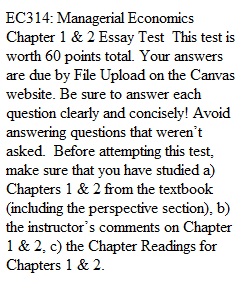


Q EC314: Managerial Economics Chapter 1 & 2 Essay Test This test is worth 60 points total. Your answers are due by File Upload on the Canvas website. Be sure to answer each question clearly and concisely! Avoid answering questions that weren’t asked. Before attempting this test, make sure that you have studied a) Chapters 1 & 2 from the textbook (including the perspective section), b) the instructor’s comments on Chapter 1 & 2, c) the Chapter Readings for Chapters 1 & 2. Chapter 1: Microeconomics: A Way of Thinking about Business (30 points) A. Property Rights and Incentives (15) 1. Many people blame the “free-market system” for a variety of “environmental” problems, including pollution and endangered species. Explain how the absence of well-defined and enforced private property rights (the tragedy of the commons) is actually the true culprit. 2. How is it possible that the presence of well-defined and enforced private property rights in goods might actually cause problems rather than solving them (the tragedy of the anticommons)? Contrast parts A and B in terms of the kinds of goods (public versus private) that are relevant in each case? B. The Prisoner’s Dilemma (15): In Chapter 1, the textbook introduces the Prisoner’s Dilemma game –perhaps the most famous of the games to come out of Game Theory -to help illustrate how private property rights might emerge. 1. Explain what is involved in the Prisoner’s Dilemma (be sure to address the general structure of the game as opposed to any one particular version of the game, such as the one that gives it its name.) 2. Adam Smith’s invisible hand metaphor says that people acting in their own self-interest make both themselves and society better off. In other words, free markets not only allow people to pursue their own self-interest, they direct people’s actions in such a way as to get them to act in the best interest of others. But economists find the Prisoner’s Dilemma game interesting because in it, players who act in their own self-interest don’t end up better off –they end up worse off instead. Is that a good thing or a bad thing that acting in their own self-interest makes them worse off? Explain. (Warning! Whenever an economist asks a question like that, the answer is almost always “BOTH!”) Chapter 2: Principles of Rational Behavior in Society and Business (30 points) A. Rational Behavior 1. Most economists base their analysis on the assumption that people act rationally. Discuss the assumption that the authors say that the notion of rational behavior is based on. (6) 2. This approach assumes “perfect” behavior on the part of human beings who are notoriously imperfect. What reasons do the authors give for why economists build their models on the premise of perfect rationality? (4) 3. Critics suggest that rational behavior can’t be true because a) people make mistakes, b) people make decisions by habit, and c) people often take into account the interests of others. Why don’t these issues invalidate the assumption of rational behavior? (6) B. The Logic of Group Behavior 1. Explain the “common interest logic” and the “economic logic” of group behavior in terms of the likelihood of the success of groups. (8) 2. How does the idea of a tough boss and a residual claimant reduce the problem of the inefficiency of large groups trying to get things done? (6)
View Related Questions